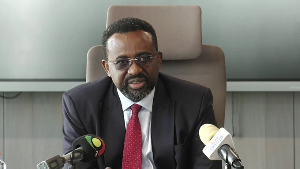Accra, Oct. 8, GNA - The Census Secretariat is holding three
concurrent operational assessment consultations with
supervisors in the northern, middle and southern zones on the
progress of the 2010 Population and Housing Census (PHS). Mr David Y. Kombat, Director of Field Operations, told the
Ghana News Agency, in an interview, in Accra, on Friday, that
the consultations were expected to end by Monday, October
11, after which the Secretariat would determine whether to
extend the period of the census or end it. He denied suggestions that the period of the 2010 PHS had
been extended. The two-week exercise, which started at on the midnight
on September 26, is expected to end on October 10. He said by the terms of contract, signed with field
enumerators, their exercise ends on October 14 by which time
they are expected to capture all within their catchments
jurisdiction, prepare and submit their reports to the
Secretariat. Mr Kombat, however, explained that the Secretariat was
not oblivious to operational challenges. He said: "We had strategic emergency mechanisms in the
general programming of the exercise to ensure that we reduce
field hiccups. "Currently, with the involvement of the military, materials
have been dispatched to all regions to supplement the forms
already in the field and make up for the shortages in some
areas, with back-up materials at Accra. "We have enough materials in the field and nobody should
use an exercise book or any other material to capture census
data; don't allow any enumerator to capture your information
on any form other than the enumeration form." On challenges some enumerators encountered on the
Census Night, especially in Accra with people who sleep
outside, Mr Kombat said an officer of the Customs, Excise and
Preventive Service (CEPS), who had been working with
"Kayayie", had been seconded to the Secretariat to assist to
capture those who were not enumerated on census night. About 50,000 enumerators have been trained by the Ghana
Statistical Office to undertake the enumeration exercise whilst
about 27,240 enumeration centres have been created. The enumerators are wearing blue "T" shirts with "2010
Census Official" written behind it. They have their ID cards
hanging on their necks. The census is to collect detailed statistics on the size of the
population for effective planning. The exercise is also to collect data on the composition and
distribution of Ghana's population, the residential
accommodation and facilities in use. "This information will be crucial in determining the
development policy direction of the county," according to the
Ghana Statistical Service (GSS). It adds that the census will be an important source of
comprehensive data on persons with disabilities, helping to
assess their social and living conditions in terms of school
attendance and educational attainment, employment, marital
status and living arrangements. This is the first time disability issues are being included in
the Population and Housing Census. The census will also include a housing census, which is the
official enumeration of all living quarters, either occupied or
vacant, and occupants thereof at that time. "The enumeration also implies the collection, compilation,
analysis and dissemination of demographic and socio-economic
statistics relating to the population," according to GSS. Ghana has had 10 population censuses since 1891. The last
population census was in 2000 when 18.9 million people were
counted. Estimates have put Ghana's population at 23.4
million.
General News of Friday, 8 October 2010
Source: GNA
















